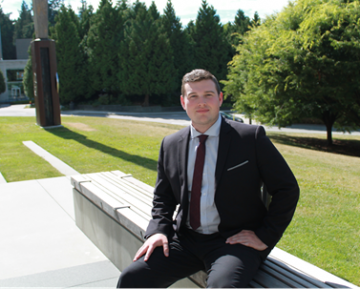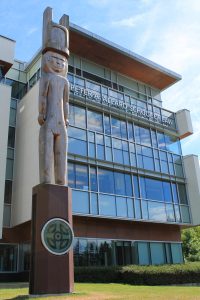
Brendan Easton, JD Candidate, Indigenous Law Students’ Association, Allard School of Law
The Peter Allard School of Law’s Indigenous Studies Legal Program recently began offering a Cultural Competency certificate. We had the good fortune of connecting with JD Candidate Brendan Easton, who has been working with the law school to introduce this program.
“A territorial acknowledgement is more than just a cultural or traditional practice; it is an exercise in legal pluralism. By using the laws of the territory, within a Canadian legal institution, we are asking for permission to conduct our business here. It is more than just ticking a box. This is a call for listeners to recognize where they are, and to understand the privileges and benefits they receive from being situated on the land.” (Brendan Easton)
Tell us a bit about yourself
I was born and raised in Victoria, British Columbia and am a citizen of the ‘Namgis First Nation. I completed my undergraduate studies at the University of Victoria with a BA in Political Science and a minor in Business. Following graduation, I was accepted into the Aboriginal Youth Internship Program and worked for the Provincial Government and the Native Courtworkers’ and Counselling Association of BC.
During my first year at the Peter A. Allard School of Law, I was involved with the Law Students’ Legal Advice Program (LSLAP), the Indigenous Law Students’ Association, the Legal Education Outreach Program, and the Allard ‘Circus’ hockey team.
In the future, I am looking to complete both the Specialization in Aboriginal Law and the Business Law Concentration, with the hopes of working in a national firm. I am enthusiastic about law school and I want to share that enthusiasm with students.
Outside of Law School, I enjoy biking around the city, sipping coffee, reading books, swimming, and adventuring. Recently, I returned from a trip to Israel, Jordan, Greece, Italy and the UK and I look forward to travelling again soon.
What does it mean to you to acknowledge the land we live and learn on as the unceded, ancestral, and traditional land of the Musqueam peoples?
A territorial acknowledgement is more than just a cultural or traditional practice; it is an exercise in legal pluralism. By using the laws of the territory, within a Canadian legal institution, we are asking for permission to conduct our business here. It is more than just ticking a box. This is a call for listeners to recognize where they are, and to understand the privileges and benefits they receive from being situated on the land. We acknowledge traditional, ancestral and unceded territory to instill a sense of commitment in each listener to the Indigenous nations who have rightful claims to this land. Whether we are racialized settlers, or white settlers, we all claim different privileges, and have different struggles, and yet we all still benefit from colonialism and dispossession of Indigenous lands.

Peter Allard School of Law
Can you tell us a bit about the project you are working on?
This year, the Peter A. Allard School of Law is introducing the Cultural Competency Certificate. The program is aligned with the Truth and Reconciliation Commission’s ‘Calls to Action’, and is a continuation of the law school’s commitment to supporting Indigenous students by fostering cross cultural dialogue and reconciliation. The objectives of the certificate are to instill an understanding around issues such as: Euro-centric teachings and the law; decolonization and the legal landscape; and Indigenous legal systems. We hope to offer students an opportunity to analyze and synthesize issues and perhaps challenge their own perspectives as to the current interactions between Indigenous peoples and Canadian law. To that end, we have created seven modules that include an Indigenous Awareness Retreat, Elder led teachings, placements within Indigenous organizations and much more!
Who should participate and where can they get more information?
This year, the program will only be offered to Faculty staff and students of Allard Law. For more information about the program and the interactive modules, please see our website.
What has been your most positive experience as a student at UBC and why?
Getting to know my fellow students has been one of the most positive experiences here at Allard Law. By comparison, my undergraduate degree was quite independent and the courses far ranging. Now at Allard, I thoroughly enjoy being surrounded everyday by students, faculty and staff who are truly passionate about the law and who look forward to navigating the complex legal questions of our time. As a law student, I participated in a few off-campus activities including the Law Students’ Legal Advice Clinic (LSLAP), and the Legal Education Outreach program (LEO). With LSLAP I attended small claims court, worksafe mediations, and criminal proceedings; and with LEO I reached out to high-school students, encouraging them to attend university and perhaps pursue a legal education. Both programs present great opportunities to give back to the community and are a large part of why I came to law school.
Tell us about something you recently read, listened to, or watched that sparked your interest.
To be honest, the summer is usually when I sit down, relax, and let my mind wander. However, this summer I have been spending my time reading the Star Wars: Aftermath Trilogy by Chuck Wendig, and watching and re-watching Game of Thrones. I’m also reading a book by Leslie A. Robertson entitled: Standing Up with Ga’axsta’las; The book reflects on the life of Jane Constance Cook (My Great-Great-Grandmother) during a tumultuous period for Indigenous people, which saw the potlatch trials, the implementation of the residential school system and other profound social and political shifts that challenged first nations’ customs and traditions – especially in Alert Bay, British Columbia.
